


North American Arms PUG: 6.4 Ounces of Instant Flames from your Fist
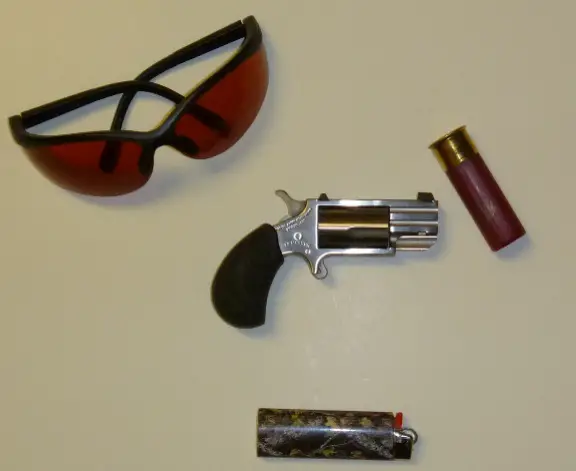
Smaller than a pair of shooting glasses, thinner than a twelve gauge shotshell, not much larger than a Bic lighter, NAA's PUG-T despite its handy size, offers instant protection for the responsible American citizen.
One of the most diminutive of the North American Arms mini-revolvers is the NAA PUG, featuring a one inch barrel and a four and one half inch overall length. The tested model is the NAA-PUG-T, factory equipped with an XS Sights Tritium front sight, making it easy to point in marginal light conditions or with essentially no light at all. Until you hold one in your hand, it is hard to believe how compact this .22 WinMag is. It is thin as well, thinner than a 12 gauge shotshell.
The .22 Winchester Magnum cartridge itself was designed in 1959. Long considered the only successful rimfire since the .22 long rifle of 1887 from J. Stevens Arms, that changed in 2002 with the introduction of the .17 Hornady .Magnum Rimfire. While gaining great success as a light varmint round, there is only so much a seventeen grain bullet can do, so for self defense its use is “limited” to put it mildly.
The widespread popularity, convenience, and effectiveness of NAA Mini-Revolvers has not gone unnoticed by the more innovative manufacturers in the industry. What has been lacking for years is not the NAA platform itself-- it is hard to get more simple or reliable than that. Ammunition to get the most out of short vented barrels suitable for self-defense hasn't been generally developed or available. That's changing in a huge way, with two industry-leading loads that I can think of that look the extend the .22 WMR self-defense platform like never before. The Speer Gold Dot load #954 gets a 40 grain bullet out of the muzzle of a 1.9 inch vented test barrel at 1150 fps.
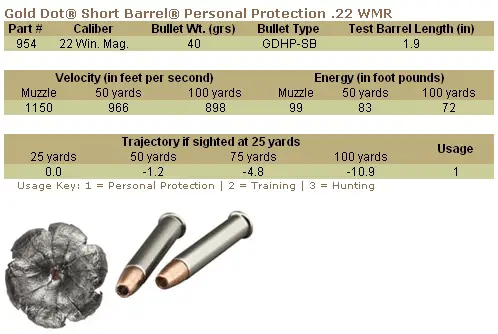
Hornady's Critical Defense load #83200 gets a heavier FTX bullet, 45 grains, out of a 1-7/8 in. vented barrel at 1000 fps or so, with positive expansion and penetration approaching the best .380 loads. Now, more than ever, the size and accessibility of the .22 WMR platform is becoming more and more appealing with loads like these optimized for short barrel use and with projectiles designed to stop the attack of two-legged varmints, not the four-legged type. Hornady testing, below, shows about 9-1/2 inches of penetration with expansion every time.
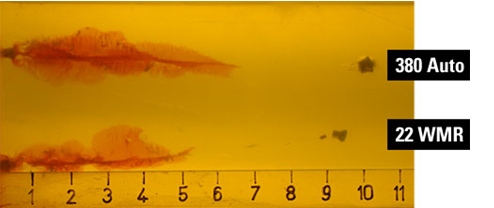
The PUG is extremely easy to use, it is very easy to put multiple hits in the K5 zone very quickly. Most of our shooting was with the Winchester Supreme 30 gr. JHP rounds, the ammo we had readily available. As soon as we obtain some of the Hornady and Speer ammunition, we will do some chronograph and accuracy testing not only with the NAA PUG-T, but also with the NAA Break-top, the NAA Mini-Master, and the Black Widow. All of these models are thin, svelte revolvers, fitting where not much else will. The primary distinction is barrel length and overall length. It is one inch for the PUG-T, two inches for the Black Widow and NAA Breaktop (a.k.a. “The Ranger”) and four inches for the NAA Mini-Master.
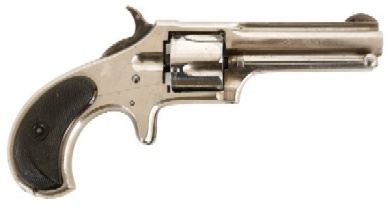
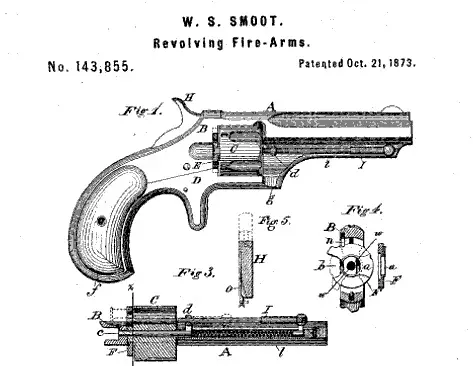
Fans of this genre of revolver will be interested in the Remington-Smoot No. 1 Revolver from 1873, as shown above, introduced in 1876. The Remington-Smoot spur trigger revolver had a two and seven eighths length octagonal barrel, sometimes claimed to be a three inch barrel, was chambered for the .30 rimfire, and weighed about ten ounces. We've come a very long ways since the early days of the pocket pistol and William Sydney Smoot to say the least. The Smoot revolvers were crude, corrosion-prone, unsafe, and underpowered black powder rimfires compared to what NAA offers today. Though five shot revolvers, they were four shot units in practice as there was no safety. Safe carry mandated the lowering of the hammer onto an empty chamber. NAA's notched cylinder solves that issue, giving you five shots when used properly as described in the NAA owner's manual:
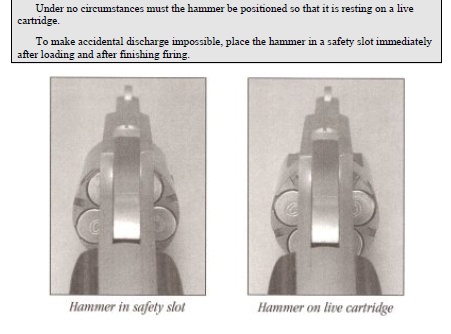
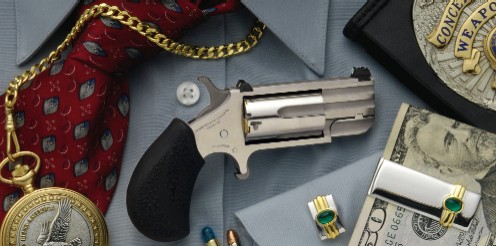
When the PUG and other NAA revolvers are used properly, you can see the rims of two cartridges, one on each side of the hammer that is lowered into the cylinder's safety notch.
I'll repeat the comments from Dr. Martin Fackler from USA Today:
“I
must confess to being a member of a very dangerous group. I am a physician:
We cause more than 100,000 deaths per year in the USA by mistakes and
various degrees of carelessness in treating our patients. Why does society
tolerate us? Because we save far more patients than we kill. Firearms
are entirely analogous. Although used in far fewer deaths* - they are
used to prevent about 75 crimes for each death. Firearms, like physicians,
prevent far more deaths than they cause.”
--Martin L. Fackler, MD Monday, Dec. 25, 2000.
Dr.
Fackler continues, “This inverse relationship between the number
of firearms in the hands of the public and the amount of violent crime
has, in fact, been proven beyond any reasonable doubt.
History supports the inverse firearm-crime relationship. In "Firearms
Control -A Study of Armed Crime and Firearms Control" in England
and Wales (London, Routledge & Kegan Paul, 1972, p. 243), Chief Inspector
Colin Greenwood found that: No
matter how one approaches the figures, one is forced to the rather startling
conclusion that the use of firearms in crime was very much less when there
were no controls of any sort. Half a century of strict controls on pistols
has ended, perversely, with a far greater use of this class of weapons
in crime than ever before.”
The presence of a firearm in the hands of the American citizen is tremendous deterrent. If the typical father and mother were trying to be pretend gunfighters or quasi-military soldiers, handguns as a class would be last on the list. It is far simpler than that. Defensive firearms are used in very close quarters when there is no other choice. They are used reluctantly, but only to protect families from attack. If indicated, the handgun is used until the attacker stops attacking. Do we still wonder why there aren't many robberies at the shooting range?
The magic of the NAA PUG-T is accessibility and reliability. It can be the available solution when no other solution is available or can be easily be made available. We all had the same opinion of the PUG-T: is more accurate than needed, more accurate than we thought, and far more comfortable to shoot than flyweight .38 Specials much less lightweight .357 Magnums. With an extra .22 LR cylinder, you can practice all afternoon with your PUG without much ammo cost. Practicing with the "good stuff," like the Hornady Critical Defense also is not cost-prohibitive, running at only one third the cost of most center-fire handgun defense rounds, or even a bit less.
The specifications:
Item Number: NAA-PUG_T
Type:
Revolver
Action: Single
Caliber: 22 Winchester Magnum
Barrel Length: 1"
Capacity: 5 rounds
Safety: Cylinder Notch
Grips: Rubber, pebble texture
Sights: Tritium Night Sights
Weight: 6.4 oz
Finish: Stainless 17-4 PH
If you set aside Hollywood and video games for a bit, I'll give you a typical example of how a self-defense firearm is commonly used based on personal experience. It was one or two in the morning, several years back, when my wife frantically woke me up. "Someone is breaking in at the front door" was the problem. I'm not sure exactly what I mumbled, but it was something to the effect that it might be a better time to take a look at our noisy refrigerator in the morning. She was right, there was someone or a group of someones banging away at the front door. Okay, so I slid out of the water bed, put some pants on and grabbed my pistol. I told my wife not to go near the front door or the living room, but to go straight to the kitchen and call the cops. The guy at the front door was agitated, to say the least. Though I couldn't get a good look at the bushes, he appeared alone. He was out of control, though, and felt he needed to come into our house. He was told, "No." Nevertheless, I opened the main door to discuss the matter with him through the screen door. He could see I had a pistol pointed at his chest with my finger on the trigger and he changed his attitude quickly. Regardless of his problems, he was told that if he came through the screen door the first two bullets were going through his chest and if he had friends, there was plenty of lead to accomodate them as well. The reason I told him he could expect bullets through his chest was a simple one-- that is exactly what I was going to give him if he decided to force his way into my home. That is the only time I have pointed a gun at another human being and was very, very close to using it. Very close.
It ended as most of these things do: a couple of squads rolled up about twenty minutes later, the unexpected problem visitor was cuffed and escorted away. We had a friendly chat with the officers and thanked them for coming out. My wife never like handguns, particularly, though she didn't mind dove hunting . . . at least when we were dating. Anyway, her appreciation of the handgun changed dramatically from that night forward. There is no glory in becoming a victim that I know of.
At a street price of under three hundred 2011 dollars or so this Tritium model, it is affordable enough to have one for Dad, one for Mom, and one for Grandma who now lives alone. With the very low comparative ammunition cost, the overall cost of ownership for an NAA PUG is less than most all intimate self-defense handguns available today. As a nation, we spend many fortunes every year on all kinds of insurance, health, home, auto, and so forth. Few of these monies are invested in assurance or prevention, yet we pay them every year.
A
PUG in the hand is worth more than anything else left in the bush, or
elsewhere. The most common comment from those that shot this NAA PUG was,
"I have to have one." You'll likely feel the same way.
Copyright 2011 by Randy Wakeman. All Rights Reserved.

Custom Search


